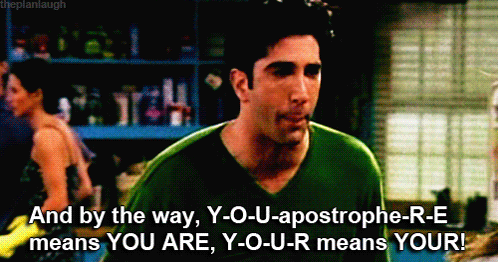Even if you've spoken English for your entire life, you probably don't know everything there is to know about the language. There are so many different rules that it's hard to keep track of them all. Not only that, but for some reason, we weren't taught all of those rules in school. There are a lot of important things that teachers leave out, because they don't have enough time to cover everything that we need to know. Of course, you don't have to remain uninformed. If you love to learn, here are a few grammar rules that most people have never learned:
Snapshot Survey
Thanks for sharing your thoughts!
Please subscribe for your personalized newsletter:
Successfully subscribed!
Thank you for subscribing! Check your inbox for personalized content.
1. When to Use "May" VS. "Might"
 You can't just arbitrarily choose whether you're going to use "may" or "might" in a sentence. They aren't the same word. There's actually a clearcut difference between the two. “May” implies a possibility while “might” implies far more uncertainty.
You can't just arbitrarily choose whether you're going to use "may" or "might" in a sentence. They aren't the same word. There's actually a clearcut difference between the two. “May” implies a possibility while “might” implies far more uncertainty.
2. When to Use "Whether" VS "if"
 Informally, people will use these words interchangeably. However, when you wish to be formal, you have to understand that there's a difference. “Whether” expresses a condition where there are two or more alternatives. “If” expresses a condition where there are no alternatives.
Informally, people will use these words interchangeably. However, when you wish to be formal, you have to understand that there's a difference. “Whether” expresses a condition where there are two or more alternatives. “If” expresses a condition where there are no alternatives.
3. When to Use "since" VS "Because"
 “Since” refers to time. “Because” refers to causation. So if you're trying to explain why you don't want to go to a party, you shouldn't say, "I can't go, since I'm grounded." You should say, "I can't go, because I'm grounded." If you wanted to use "since," you could say, "I haven't been out of the house since last week."
“Since” refers to time. “Because” refers to causation. So if you're trying to explain why you don't want to go to a party, you shouldn't say, "I can't go, since I'm grounded." You should say, "I can't go, because I'm grounded." If you wanted to use "since," you could say, "I haven't been out of the house since last week."
4. When to Use "Different than" VS "Different from"
 This one is actually pretty controversial. If you're writing a paper, you should use "different from" to be safe, because some people are completely against the use of "different than" in any situation. Of course, both phrases have been used for hundreds of years, which is why some don't mind hearing either one. English is a funny thing.
This one is actually pretty controversial. If you're writing a paper, you should use "different from" to be safe, because some people are completely against the use of "different than" in any situation. Of course, both phrases have been used for hundreds of years, which is why some don't mind hearing either one. English is a funny thing.
Sunshine and blue skies bring positivity and joy and it's important for every woman to take full advantage of it. Even when stuck indoors, it's still possible to enjoy some good vibes. Check out these unique tips on how to make the most of the weather right at your home. Let's celebrate every beautiful day, no matter where we are.
5. When to Use "Irony" VS "Coincidence"
 Most people have the wrong idea about irony. What's the actual definition? Well, irony is the "incongruity in a series of events between the expected results and the actual results." Meanwhile, "coincidence" is a series of events that appear planned when they’re actually accidental.
Most people have the wrong idea about irony. What's the actual definition? Well, irony is the "incongruity in a series of events between the expected results and the actual results." Meanwhile, "coincidence" is a series of events that appear planned when they’re actually accidental.
Gallery Spotlight
Save and share the images that inspire you. Tag @allwomenstalk to get featured.
Save
6. When to Use "That" VS "Which"
 These two words seem like they could be interchangeable, but they're not. What's the difference? “That” defines while “which” informs or adds extra information. That's why you would say, "Dogs that bark scare me" and "Purebred dogs, which make amazing pets, are expensive." If you'd like to learn more, check out Grammar Girl for some quick and dirty tips.
These two words seem like they could be interchangeable, but they're not. What's the difference? “That” defines while “which” informs or adds extra information. That's why you would say, "Dogs that bark scare me" and "Purebred dogs, which make amazing pets, are expensive." If you'd like to learn more, check out Grammar Girl for some quick and dirty tips.
7. When to Use "like" VS "Such as"
 This is another grammar rule that is so frequently ignored that it might as well stop existing. However, technically “like” excludes while “such as” includes. That's why "like" should be mainly used for comparisons while "such as" should be used in lists.
This is another grammar rule that is so frequently ignored that it might as well stop existing. However, technically “like” excludes while “such as” includes. That's why "like" should be mainly used for comparisons while "such as" should be used in lists.
8. When to Use "Who" and "Whom"
 You might think these two words are the same, but they should actually be used in different instances. "Who" is a subjective pronoun like "she" or "he." On the other hand "whom" is an objective pronoun like "him" or "her." You'll use one when referring to the subject of the sentence and the other when referring to the object of the sentence. You'll avoid all kinds of grammatical faux pas when you adopt this rule.
You might think these two words are the same, but they should actually be used in different instances. "Who" is a subjective pronoun like "she" or "he." On the other hand "whom" is an objective pronoun like "him" or "her." You'll use one when referring to the subject of the sentence and the other when referring to the object of the sentence. You'll avoid all kinds of grammatical faux pas when you adopt this rule.
9. When to Use "lay" and "lie"
 This is a grammatical rule that many people don't fully understand and that is mixed up all the time. "Lay" is a transitive verb and requires at least one object in the sentence to be used. "Lie" is an intransitive verb that can be used in a sentence without an object. This one can get confusing so be sure you're on the lookout for an object so you know which version to use.
This is a grammatical rule that many people don't fully understand and that is mixed up all the time. "Lay" is a transitive verb and requires at least one object in the sentence to be used. "Lie" is an intransitive verb that can be used in a sentence without an object. This one can get confusing so be sure you're on the lookout for an object so you know which version to use.
10. When to Use "farther" and "further"
 Again, these two words might seem interchangeable, but they aren't. You will only use "farther" when you are talking about a quantifiable measurement. If not, you'll use "further," which implies a distance that can't be measured and that is merely an abstract distance.
Again, these two words might seem interchangeable, but they aren't. You will only use "farther" when you are talking about a quantifiable measurement. If not, you'll use "further," which implies a distance that can't be measured and that is merely an abstract distance.
11. Could Have Vs Could of
 This is one of my pet peeves. When people write or say this they are trying to say “could’ve” which is a contraction of “could have”. This is never interchangeable with “could of” which doesn’t mean anything, ever. There is no correct use of any could of, should of, would of, It is always Could have, should have, would have.
This is one of my pet peeves. When people write or say this they are trying to say “could’ve” which is a contraction of “could have”. This is never interchangeable with “could of” which doesn’t mean anything, ever. There is no correct use of any could of, should of, would of, It is always Could have, should have, would have.
If you want to become a great writer and speaker, you should keep these grammar rules in mind. Even though most people ignore them, it doesn't mean that you should. Did you know all of these important grammar rules, or are some of them news to you?
Bonus point
Snapshot Survey
Thanks for sharing your thoughts!
Please subscribe for your personalized newsletter:
Successfully subscribed!
Thank you for subscribing! Check your inbox for personalized content.
Comments

Don't Miss the Latest Version
Get the latest stories, save favorites, and share with friends — all in one place.
Create your profile. Earn badges. Level up your reading.
Join Allwomenstalk to track your streaks, collect badges, and earn XP for the things you already do—reading, sharing, and taking quizzes.
- 🔥Daily streaks with gentle boosts for 3, 7, and 30 days.
- 🏅Collect badges like Reader I–III, Socialite, and Quiz Ace.
- ⚡️Earn XP for reads, deep reads, likes, comments, and shares.
It’s free. Takes 30 seconds. Already have an account? Sign in.




Feedback Junction
Where Thoughts and Opinions Converge